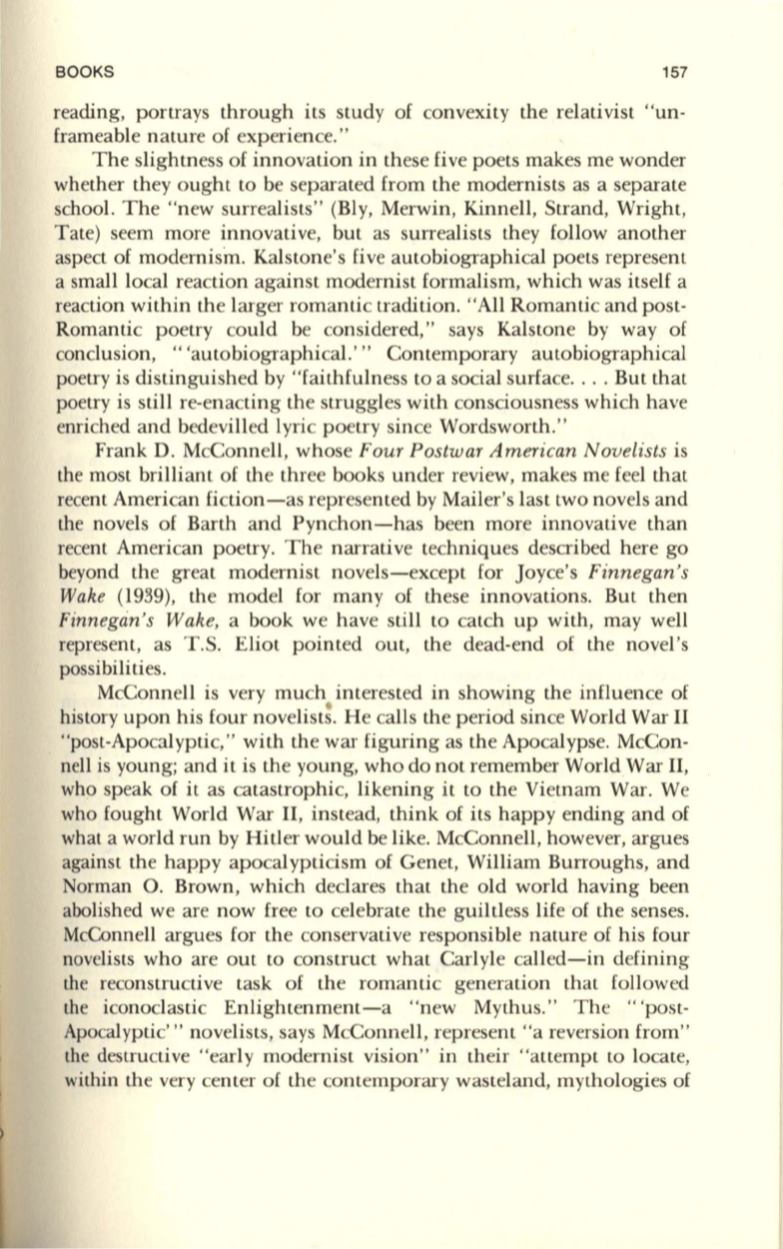
BOOKS
157
reading, portrays through its study of convexity the relativist "un–
frameable nature of experience."
The slightness of innovation in these fi ve poets makes me wonder
whether they ought to be separated from the modernists as a separate
school. The "new surrealists" (Bly, Merwin, Kinnell, Strand, Wright,
Tate) seem more innovative, but as surrealists they follow another
aspect of modernism. Kalstone's five autobiographical poets represent
a small local reaction against modernist formalism, which was itself a
reaction within the larger romantic tradition. "All Romantic and post–
Romantic poetry could be considered," says Kalstone by way of
conclusion, "'autobiographicaL'" Contemporary autobiographical
poetry is distinguished by "faithfulness
to
a social surface.... But that
poetry is still re-enacting the struggles with consciousness which have
enriched and bedevilled lyric poetry since Wordsworth."
Frank D. McConnell, whose
Four Postwar American Novelists
is
the most brilliant of the three books under review, makes me feel that
recent American fiction-as represented by Mailer's last two novels and
the novels of Barth and Pynchon-has been more innovative than
recent American poetry. The narrative techniques described here go
beyond the great modernist novels-except for Joyce's
Finnegan's
Wake (1939),
the model for many of these innovations. But then
Finnegan's Wake,
a book we have still to catch up with, may well
represent, as T.S. Eliot pointed out, the dead-end of the novel's
possibilities.
McConnell is very much interested in showing the influence of
history upon his four novelists. He calls the period since World War II
"post-Apocalyptic," with the war figuring as the Apocalypse. McCon–
nell is young; and it is the young, who do not remember World War II,
who speak of it as catastrophic, likening it to the Vietnam War. We
who fought World War II, instead, think of its happy ending and of
what a world run by Hitler would be like. McConnell, however, argues
against the happy apocal ypticism of Genet, William Burroughs, and
Norman O. Brown, which declares that the old world having been
abolished we are now free to celebrate the guiltless life of the senses.
McConnell argues for the conservative responsible nature of his four
novelists who are out to construct what Carlyle called-in defining
the reconstructive task of the romantic generation that followed
the iconoclastic Enlightenment-a "new Mythus." The "'post–
Apocalyptic'" novelists, says McConnell, represent "a reversion from"
the destructive "early modernist vision" in their "attempt to locate,
within the very center of the contemporary wasteland, mythologies of


